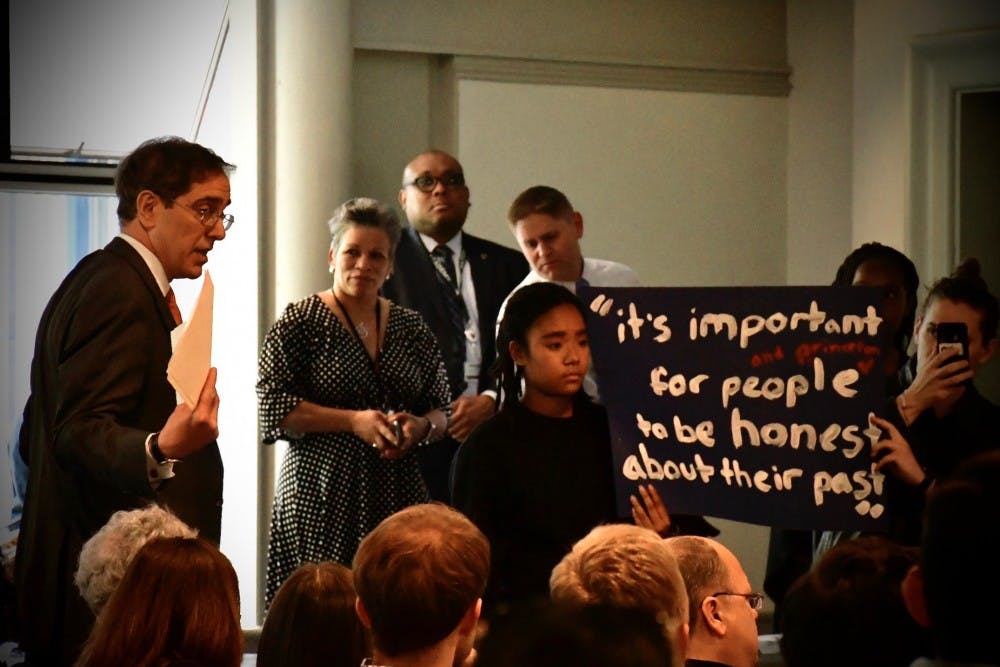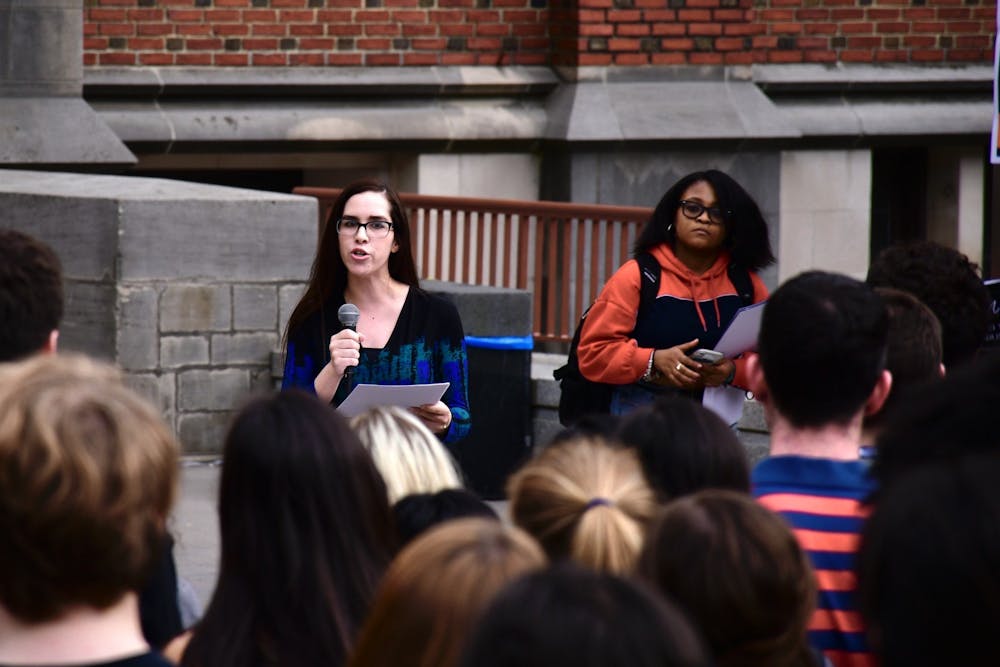Over 550 students and alumni are calling on the University to divest from the U.S. prison system and publicly disclose its endowment holdings.
“We, the undersigned, call upon the Princeton University Investment Company (PRINCO) to immediately and unequivocally divest Princeton’s holdings from the Prison-Industrial Complex,” notes a petition by Students for Prison Education, Abolition, and Reform (SPEAR).
Four hundred and thirteen undergraduates, 48 graduates, nine faculty, and over 100 alumni signed the petition. Deputy University Spokesperson Michael Hotchkiss told The Daily Princetonian administrators “appreciate engagement by the University community on this complex and important issue.”
Known for its campus demonstrations against solitary confinement, SPEAR has led protests in support of Ban the Box, a campaign to remove the question that requires University applicants to disclose their personal conviction histories, and held college access programs for incarcerated individuals.

Eisgruber interacts with Ban the Box protestors at a CPUC meeting.
Jon Ort / The Daily Princetonian
The 2020 campaign builds upon previous activism from the Princeton Private Prison Divest Coalition, which pressured the University to divest from private prisons from 2016-2018.
In an undergraduate referendum from 2016, eighty-nine percent of voters indicated the University and PRINCO should dissociate and divest from 11 corporations that participate in the prison system. The referendum, however, failed to reach the one-third voter threshold required to pass.
The 2016 coalition still raised the issue to the Council of the Princeton University Resources Committee, which evaluates divestment recommendations. This push culminated in an April 20 report from the Resources Committee, which claimed “Princeton has not invested for many years — either directly or indirectly — in the 11 detention corporations, private prisons or affiliated contracts.” Still, the committee recommended against formal divestment.
“Our committee concurred that the broader criminal justice system, which includes both public and private prisons, needs large-scale amelioration. But we did not arrive at sufficient consensus to recommend divestment from private prisons,” the report noted.
He added, “The Resources Committee review process remains available for divestment proposals brought forward on any topic.” The Committee is currently reviewing a proposal to divest from the fossil fuel industry, originally delivered to administrators in February.
Despite the student activists’ prior lack of success, the newer petition — cosigned by Princeton IX Now, ChangeWWS Now, and the Princeton Latin American Student Association — pushes further.

The campaign broadens the definition of the prison complex system to include public prisons at the local, state, and federal levels. It also includes companies, such as Aramark, a food services corporation spotted on campus in 2019, that profit from the prison system. Aramark reports serving 380 million prison meals a year.
As of 2013, prisoners held in privately owned prisons constitute 8.4 percent of the total U.S. prison population, according to the U.S. Department of Justice. Such a small percentage makes the University’s divestment from private prisons “low-hanging fruit,” said Masha Miura ’21, co-president of SPEAR.
Given the University’s renewed commitment to anti-racist action — with senior academic and administrative leaders, including PRINCO President Andy Golden, tasked “to identify specific actions that can be taken in their areas of responsibility to confront racism” in June — SPEAR leaders expect substantive change.
For Miura, private and public prisons alike are enmeshed in capitalism. Private companies serving the prison system also receive funding from the government and actively marginalize and abuse people of color, she said.
“Princeton is not just complicit but also actively fueling these companies and private and public prisons contributing to the major detriment of people’s lives and communities,” Miura said.
“A lot of these companies don’t care about the incarcerated individuals and [care] more about their contracts or the best ways to make money and maintain relationships with private prisons,” she added.
Gina Feliz ’22, student leader of the divestment initiative, stressed that the University must also look beyond prisons.
“We want to emphasize that criminal justice, the legal system, and the act of caging people and lifelong punishment is still an issue,” Feliz said. “We’re responsible for maintaining a violent prison system, especially for poor folks of color across the U.S.”
Beyond divestment, SPEAR is pushing the University and PRINCO to “rebuild and repair the harm” by funding initiatives “led by people directly impacted by the prison-industrial complex,” creating academic projects that employ formerly incarcerated people, and pledging for future ethical investments.
“We want to support people by ethically investing in local communities, grassroots campaigns, or communities harmed by mass incarceration,” Feliz said.
Ethical investments “uplift those harmed by the criminal justice, legal, and prison system,” Feliz added.
The petition also demanded the University “disclose Princeton’s investments and divest from private prisons and the prison-industrial complex,” in addition to dissolving contracts with companies profiting from the prisons.
“The biggest problem we came across was that we don’t know [Princeton’s investment in the prison industrial complex] because Princeton is not obligated to release its investment portfolio,” Miura said.
More broadly, SPEAR calls for the public disclosure of “all endowment holdings.” PRINCO has previously declined to provide such disclosures.
Earlier this year, the Rev. Al Sharpton called on the University and several of its peer institutions to detail the demographics of asset managers who oversee their endowments.
While pointing to several initiatives undertaken to diversify PRINCO’s money managers, Golden told The Daily Princetonian he did not intend to create such a report, for fear that rivals would reverse-engineer PRINCO’s investing strategy and harm the endowment’s earnings.
For the petitioners, however, transparency would foster accountability. “Isn’t it more important we adhere to ethical and moral standards than looking to turn a profit?,” Feliz asked.
“If we are seen as being complicit in a system that perpetuates human rights abuses, how true are we staying to our core values as an educational institution?,” she added.
On August 12, SPEAR leaders submitted their proposal to ideasforchange@princeton.edu, an address that allows community members to give input on how the University can fight racism. In a late-June message, University President Christopher Eisgruber ’83 announced that senior leaders would “come together as a Cabinet in late August to discuss the results of our work and develop clear plans for implementation and accountability.”
For more on prison divestment, listen to “SPEAR-heading a movement” — our Aug. 4 episode of Under the Bubble — on Spotify, Apple Podcast, Google Podcast, or on our website.








